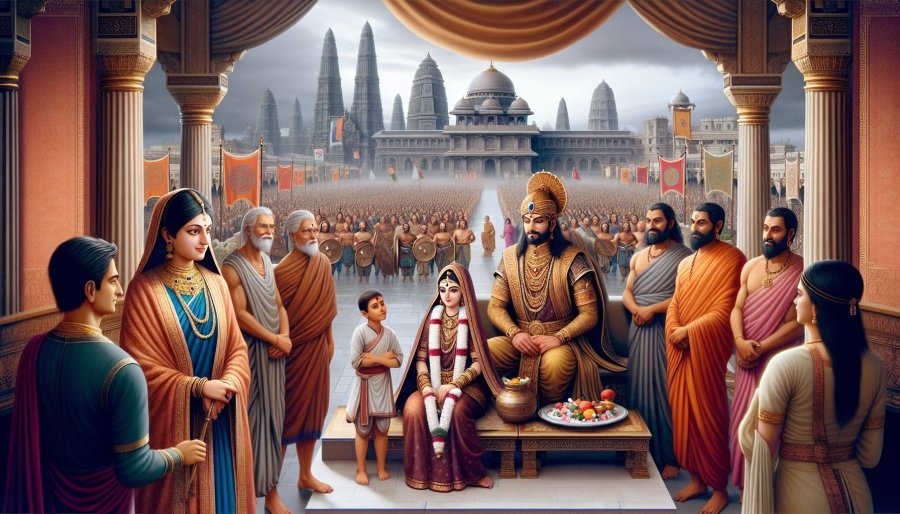Section LXXIII - Sakuntala and Dushmanta's Wedding: Gandharva Form Marriage
Book index: Mahabharata (English)
This page contains a summary of the Mahabharata Section LXXIII including examples of moral lessons in daily life. The Maha-Bharata is one of the largest epics ever written containing roughly 100,000 Sanskrit verses. It deals with the legendary history of ancient India and contains a large number of interwoven tales.

Short summary of the chapter:
Sakuntala, a beautiful maiden raised in the forest by the sage Kanva, meets King Dushmanta and they fall in love. Dushmanta proposes marriage to her and she agrees, but only on the condition that their son will be the heir to the throne. Dushmanta promises to fulfill her request and they marry in the Gandharva form. Dushmanta then leaves to return to his kingdom, promising to send his troops to escort Sakuntala to the capital.
Meanwhile, Sage Kanva returns to find out about Sakuntala's marriage to Dushmanta and is pleased with her choice. He blesses them and foretells that their son will be powerful and have command over the seas. Sakuntala, wanting to benefit Dushmanta, asks for the Paurava monarchs to always be virtuous and never lose their thrones. Kanva grants her wish, showing his approval of the marriage.
Sakuntala, displaying her deep respect and loyalty towards her father, washes his feet and asks him to bless Dushmanta and his ministers. Kanva, moved by her devotion, is inclined to bless Dushmanta as well. Sakuntala then asks for the well-being and righteousness of the Paurava monarchs, ensuring that they will always rule virtuously and retain their thrones. Kanva grants her this blessing, further solidifying his support of her marriage to Dushmanta.
Full English translation:
This page is merely a summary which is automatically generated. If you are looking for authentic sources such as the Sanskrit text or the Full English translation of Mahabharata Section LXXIII - Sakuntala and Dushmanta's Wedding: Gandharva Form Marriage, have a look at the following articles:
Section LXXIII, online text
English translation by Kisari Mohan Ganguli.
Read this and other chapters online.
Mahabharata (English Summary)
by Kisari Mohan Ganguli | ISBN-10: 8121505933
Buy the latest edition:
FAQ of Mahabharata, Section LXXIII:
FAQs
Is Gandharva marriage suitable for all castes? The Gandharva form is primarily suitable for Kshatriyas, but also permissible for kings. What did Sakuntala ask of King Dushmanta? Sakuntala asked that their son become Dushmanta's heir-apparent. What was Kanva's reaction to Sakuntala's marriage? Kanva blessed Dushmanta and prayed for the virtuosity and stability of his dynasty.
Daily life: Sakuntala and Dushmanta's Wedding: Gandharva Form Marriage:
The story of Dushmanta and Sakuntala offers several life lessons that can be integrated into our daily routines and mental frameworks. Firstly, it teaches the importance of speaking and acting with thought and consideration for others’ feelings and societal norms. Dushmanta and Sakuntala show respect and caution in their approach to marriage, highlighting the value of mutual consent and promise-keeping in relationships. This can remind us to approach our interactions with honesty, respect, and integrity, ensuring we keep our word and respect others' autonomy.
Secondly, the narrative emphasizes the virtue of being reflective and seeking the counsel of wiser, more experienced individuals. Dushmanta's contemplation about the consequences of his actions and Kanva's understanding response illustrate the importance of reflection and guidance in decision-making. In daily life, this translates to the practice of pausing to reflect on our actions and seeking advice when faced with important decisions, fostering a habit of mindfulness and learning from the wisdom around us.
Finally, Sakuntala's request for a blessing for Dushmanta and his lineage underlines the significance of wishing well for others, even in situations that may seem personal or self-contained. Their story encourages us to nurture benevolence and extend our good intentions beyond our immediate concerns, promoting a culture of kindness and positive wishes for the broader community. By adopting these lessons, we can foster healthier relationships, make wiser decisions, and contribute to a more compassionate society.
